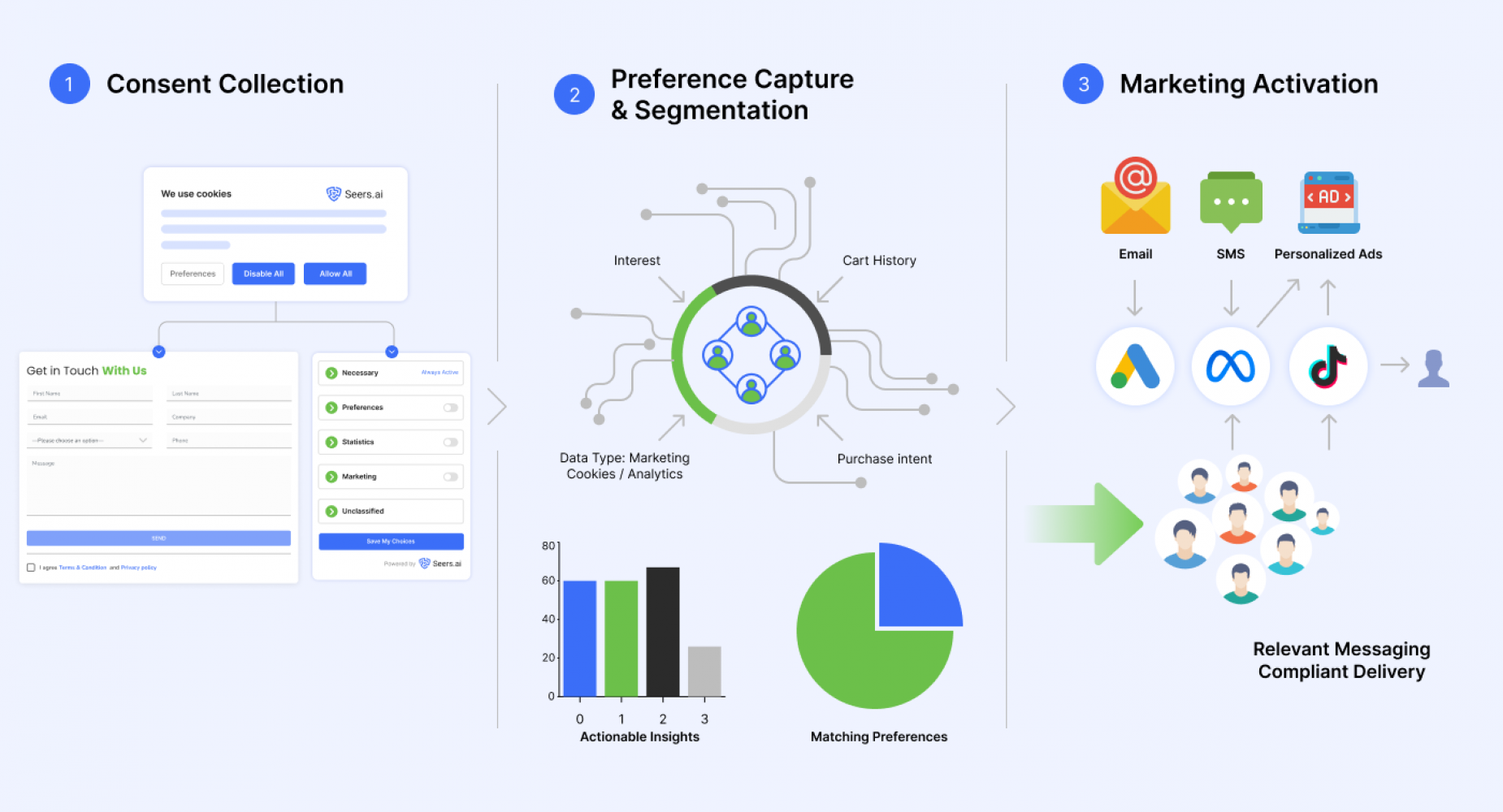Is your marketing truly reaching the right people in a world where privacy matters the most? With users wanting control over their data, businesses need smarter, consent-driven strategies to connect effectively and build trust. Consent-based marketing is emerging as the solution that not only respects user privacy but also drives higher engagement and revenue.
This blog will guide you through what consent-based marketing is, why it’s essential, how it works, and how businesses can leverage technology to activate consent-driven strategies across channels. By the end, you’ll understand how to build trust, capture actionable data, and transform it into meaningful marketing outcomes.
Consent-based marketing engages users based on clear agreements and trust, focusing on respectful and meaningful interactions.
Marketing has evolved dramatically over the last few decades. Traditional advertising relied on broad campaigns that interrupted users with generic messages. Then came permission marketing, pioneered by Seth Godin, where users opted in to receive communications.
Now, we are entering the consent-based era, driven by data privacy regulations, cookie restrictions, and consumer expectations for transparency and control.
Consent-based marketing is the practice of collecting explicit permission from users before engaging them. It focuses on delivering personalised experiences based on individual preferences, ensuring that marketing respects privacy while fostering trust.
The core purpose is to create meaningful interactions rather than generic mass campaigns.
Privacy laws like GDPR, CCPA, and the emerging UK Data Protection reforms have reshaped how businesses can collect and use data. Tracking limitations and cookie deprecation make traditional methods less reliable.
Consumers now expect clear choices over what data is collected and how it’s used. Meeting these expectations isn’t just legal compliance; it’s a business advantage.
Consent-based marketing operates by systematically capturing user preferences and translating them into actionable marketing strategies. It creates a framework for compliance while powering personalisation and segmentation.

The first step is to collect consent in a transparent, user-friendly way. Methods include:
These mechanisms capture user consent respectfully, ensuring compliance and fostering a positive brand impression.
Once collected, consent data becomes a powerful signal for marketing personalisation. Businesses can segment users based on interests, communication preferences, and purchase intent. This allows highly relevant messaging, improving engagement and conversion rates.
Consent enables marketing activation across multiple channels without regulatory risk:
By activating consent data effectively, businesses can reach the right audience with the right message at the right time.
Consent-based marketing drives superior outcomes by aligning user intent with personalised messaging. It enhances engagement, loyalty, and the value of marketing investments.
When users provide consent, they are actively expressing interest. This high-intent audience typically results in:
Marketing to users who are genuinely interested reduces wasted spend and improves ROI.
Consent signals trust. Customers who feel respected are more likely to stay loyal, refer others, and make repeat purchases. Businesses that prioritise consent are perceived as ethical and trustworthy, enhancing their long-term value.
Unlike third-party data, zero-party data is willingly shared by users. It includes preferences, interests, and purchase intent. This data is highly accurate and reliable for targeting, personalising campaigns, and predicting customer behaviour, making it a valuable asset today.
Consent-based marketing operates within legal frameworks while allowing creativity. Understanding and following regulations ensures ethical and effective campaigns.
Valid user consent must be:
Adhering to these principles ensures compliance while maintaining customer trust.
A positive user experience encourages consent. Best practices include:
These approaches avoid dark patterns, ensuring ethical and effective consent collection.
Businesses must track, store, and document consent. Consent Management Platforms (CMPs) like Seers Ai simplify this process by providing audit-ready records and centralised management, making compliance effortless across multiple domains.
Consent data becomes actionable when integrated into campaigns, segmentation, and automation. It drives relevant interactions that resonate with users.
Consent data allows marketers to build segments based on user preferences, communication channels, and interests. This segmentation ensures campaigns are relevant and reduces marketing waste.
Automation tools can trigger personalised journeys based on consent signals. For instance, a user who opts in for email updates about a product category can automatically receive tailored recommendations, promotions, and content.
Analysing consented behaviour allows marketers to refine campaigns. Metrics like engagement, click-through, and purchase patterns guide optimisation, helping businesses deliver more effective, relevant messaging.
Modern marketing relies on technology to manage consent and activate it across channels. The right tools ensure compliance while enabling effective personalisation.
A good CMP captures, stores, and manages consent across multiple domains. Preference centres allow granular control, letting users specify exactly what communications they want.
Integrations with platforms like Google Consent Mode v2, Microsoft Ads, Meta, and DSPs ensure that consent data drives compliant targeting, reporting, and measurement across advertising channels.
Consent data feeds into CRMs, email automation, and campaign management platforms. This enables personalised messaging, dynamic segmentation, and automated journeys while ensuring compliance at every step.
Consent-based marketing represents a shift from interruption to engagement, from intrusive ads to trusted experiences. By collecting, managing, and activating consent data effectively, businesses can improve campaign performance, foster loyalty, and unlock the value of zero-party data.
The future of marketing is privacy-first, and consent-driven strategies are at its core. Leveraging the right technology ensures that compliance and creativity go hand in hand, empowering businesses to connect with audiences authentically and profitably.
Unlock consent-based marketing with Seers Ai to capture preferences, personalise campaigns, and drive privacy-led growth; building trust and delivering meaningful, compliant interactions that truly engage your audience.
START FREEConsent-based marketing allows businesses to engage users who have explicitly agreed to receive communications. This leads to higher engagement rates, better personalisation, and improved trust. By leveraging consent data, marketers can build high-intent audiences, reduce wasted spend, and ensure campaigns comply with privacy regulations like GDPR and CCPA, ultimately improving customer loyalty and lifetime value.
Unlike traditional email marketing, which often relies on broad outreach, consent-based marketing focuses on engaging users who have explicitly opted in. This approach prioritises user preferences and consent signals, resulting in more relevant messaging, higher open and click-through rates, and a stronger brand relationship, while ensuring compliance with privacy regulations.
Zero-party data, collected directly from users through preferences, surveys, and interactions, is a cornerstone of consent-based marketing. It enables precise personalisation, segmentation, and predictive marketing without relying on third-party tracking. This type of data builds trust, improves campaign relevance, and ensures marketers comply with privacy regulations while delivering meaningful experiences.
Valid consent in marketing must be freely given, specific, informed, unambiguous, and easy to withdraw. Businesses should provide clear explanations, granular options for data usage, and accessible ways for users to manage preferences. Proper documentation and storage of consent records are essential for audits and compliance with regulations like GDPR, CCPA, and other emerging data protection laws.
To increase opt-ins, marketers should focus on transparency, value exchange, and user-friendly experiences. Clear messaging about data usage, well-timed prompts, intuitive design, and visible benefits of sharing preferences help encourage consent. Avoiding dark patterns and providing granular control over communication choices ensures higher opt-in rates and strengthens trust with users.
Consent-based marketing provides clear data on user preferences, allowing businesses to tailor messaging across email, SMS, display ads, and website experiences. By segmenting audiences based on consent signals, marketers can deliver relevant, personalised campaigns that respect privacy, increase engagement, and maintain compliance with global data protection regulations.
Take our Free Cookie Audit and find out
Join 50,000+ websites using Seers.Ai to turn compliance into trust, insights, & measurable business growth.


United Kingdom
24 Holborn Viaduct
London, EC1A 2BN
Get our monthly newsletter with insightful blogs and industry news
By clicking “Subcribe” I agree Terms and Conditions

Seers Group © 2026 All Rights Reserved
Terms of use | Privacy policy | Cookie Policy | Sitemap | Do Not Sell or Share My Personal Information.